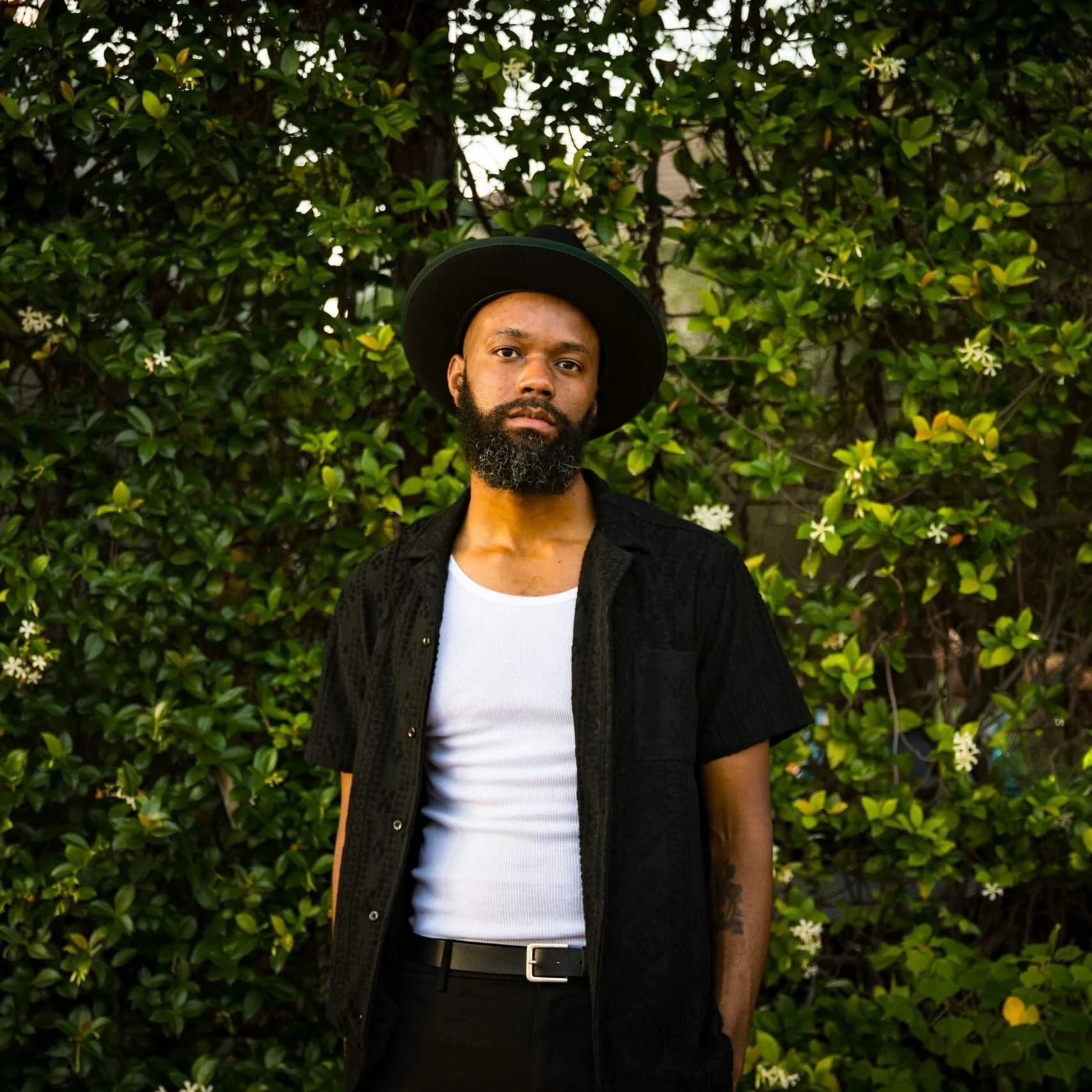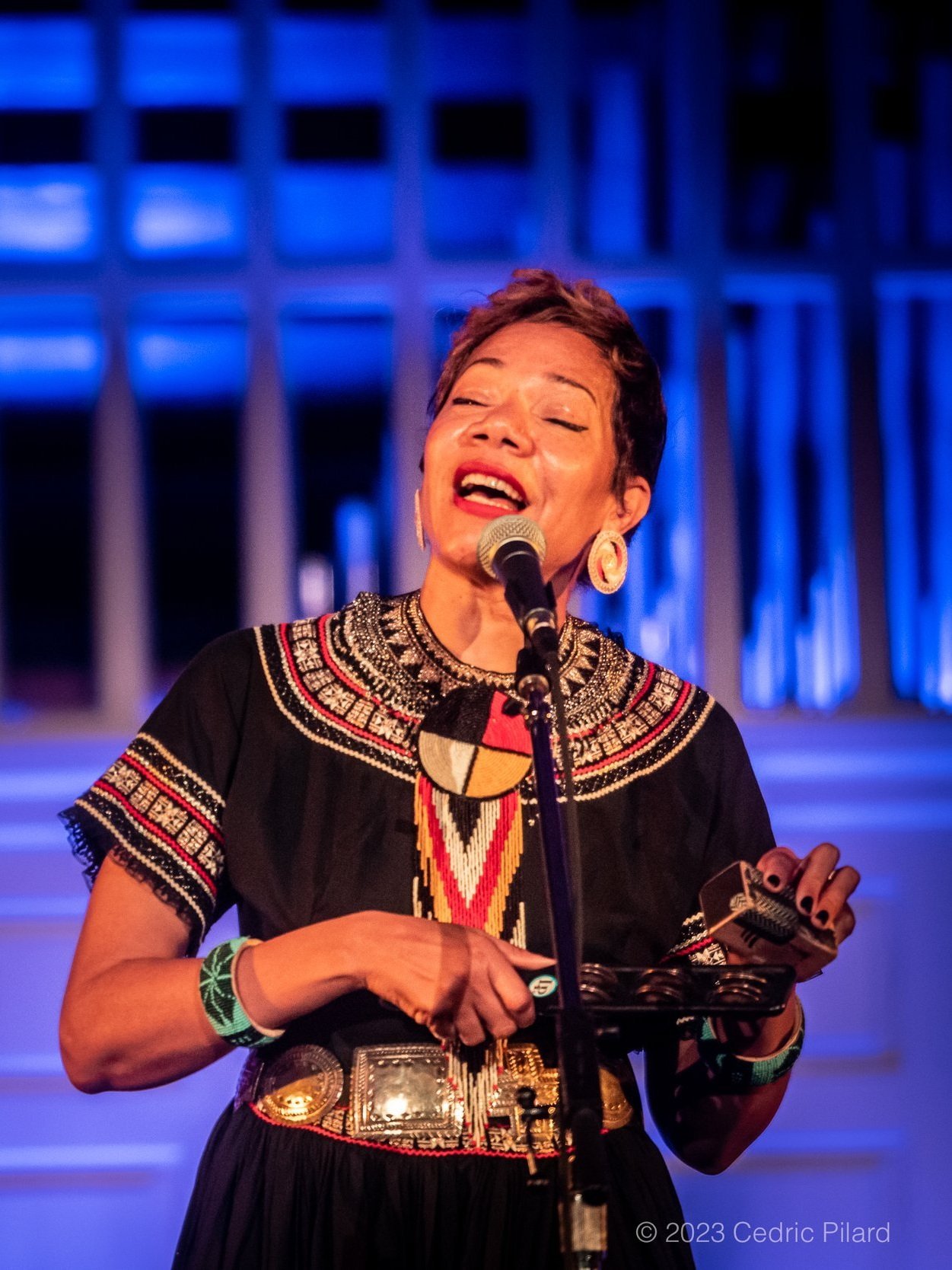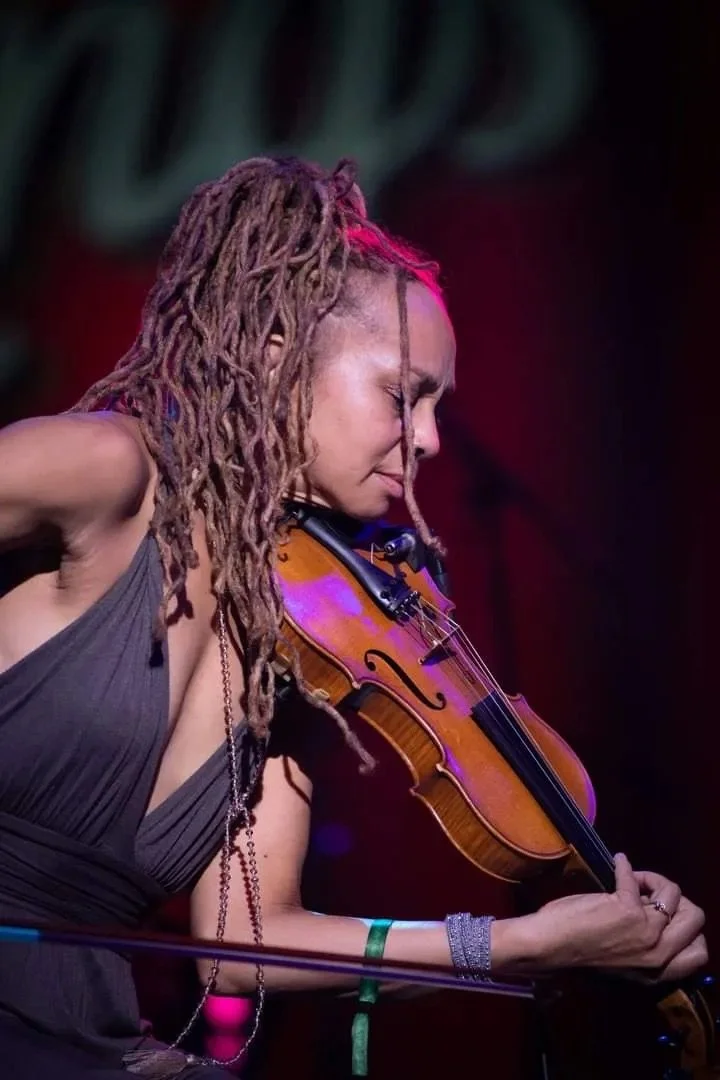2025 LINEUP
Buffalo Nichols
Carl Nichols has been releasing music under the Buffalo Nichols moniker since 2021, but his commitment to creative expression dates back to his teens. Whilst his contemporary take on the blues has taken him from the Late Show with Stephen Colbert to NPRs Tiny Desk concert series, his refusal to bend to genre expectations has seen him be embraced by the audience at underground music festival Roadburn in The Netherlands, and will soon see him hitting the road with extreme doom trio, Primitive Man. In truth, his music owes as much to the traditions of the blues as it does to the fuzz and distortion of shoegaze. Following the lead of his idiosyncratic artistic desires means that Buffalo Nichols continues to confound, continues to experiment, and continues to find new audiences for his heartfelt, emotionally heavy output. Shying away from making something challenging is simply not an option - be that his personal, political lyrics or his sonic exploration missions into the void. Wherever he leads, curious minds will follow.
Martha Redbone
Martha Redbone is an American vocalist, songwriter, composer, educator, and United States Artist Fellow, celebrated for her “brilliant collision of cultures” (The New Yorker), embodying the folk and mountain blues sounds of her childhood in “Coal country” Harlan County, Kentucky with the eclectic grit of her teenage years in pre-gentrified Brooklyn. Inheriting her powerful gospel-singing father’s voice and the resilient spirit of her mother’s Southeastern Indigenous and African American culture, Martha’s culture and heritage broadens the boundaries of American Roots music. Her songs and storytelling share her life experience as an Afro-Indigenous mother in an ever-changing world. Working in partnership with longtime collaborator Aaron Whitby, their works include Original Music and Score for the 2022 Broadway revival “for colored girls who have considered suicide/when the rainbow is enuff, Ntozake Shange and 2020 Drama Desk Award- Outstanding Composer in a Play, Public Theater, NYC. Their musical works uplift issues of social justice, connecting cultures and celebrating the human spirit.
Sunny War
It’s no secret that great art comes from the margins. From those who are either pushed to create from inner forces, or who create to show they deserve to be recognized. Los Angeles-based street singer, guitarist, and roots music revolutionary Sunny War has always been an outsider, always felt the drive to define her place in the world through music and songwriting. Her restless spirit, a byproduct of growing up semi-nomadic with a single mother, led her to Venice Beach, California, where she’s been grinding the pavement for some years now, making a name for her prodigious guitar work and incisive songwriting, which touches on everything from police violence to alcoholism to love found and lost.
Justin Robinson
Justin Robinson is a Grammy-winning musician and vocalist, cultural preservationist, and historic foodways expert. Robinson has used his wide range of interests and talents to preserve North Carolina’s African American history and culture, connecting people to the past and to the world around them.
Robinson grew up in Gastonia, NC. Influenced by the musical tastes of his grandparents, he grew to love a diversity of musical styles. He played with the Carolina Chocolate Drops, thereby working to preserve traditional forms of music, to introduce new generations to musical legends like Joe Thompson, and to remind audiences that the fiddle was, historically, an African American instrument. He wrote the song Kissin’ and Cussin’ for the group’s Grammy-winning album, Genuine Negro Jig, and continued to write music after leaving the group in 2011, releasing the album Bones for Tinder as Justin Robinson and the Mary Annettes in 2012.
In addition to preserving African American musical traditions, Robinson is known for his work as a culinary historian. He explores the ways that foods of the African diaspora shaped and influenced Southern foodways, and reveals how foods like rice, black-eyed peas, and okra can be traced directly to the African continent. Robinson is also committed to helping African Americans rekindle their ties to the land. He is a founding member of the Earthseed Land Cooperative, a collective in northern Durham “made up of farmers, entrepreneurs, professionals, and teachers who are currently engaged in creating alternative models for sustainability, equity, and cooperation within communities of color.” Justin Robinson holds a BA in Linguistics from UNC-Chapel Hill and an MS in Forestry and Environmental Science from NC State University. He is a member of the Conservation Trust for North Carolina Board of Directors.
Jake Blount
Initially recognized for his skill as a string band musician, Blount has charted an unprecedented, Afrofuturist course on his pilgrimage through sound archives and song collections. In his hands, the banjo, fiddle, electric guitar and synthesizer become ceremonial objects used to channel the insurgent creativity of his forebears. Blount’s performances - like his recent Smithsonian Folkways releases, symbiont (‘24) and The New Faith (‘22) - merge centuries-old traditional songs with trappings and techniques of modern Black genres. This “genrequeer” approach to the traditions has earned his music a place in the very same archives from which he extracts his repertoire.
Blount has shared his music at venues including Carnegie Hall, Newport Folk Festival, the Library of Congress and NPR’s Tiny Desk. Starting with his full-length debut Spider Tales (‘20), each of Blount's records has appeared on "best of year" lists from outlets including Bandcamp, The New Yorker, NPR, The Guardian, and Rolling Stone. Blount also has the Steve Martin Banjo Prize, two International Folk Music Awards nominations and two first-place ribbons from Clifftop already under his belt, and also served as a music consultant on Ryan Coogler's Sinners.
Blount is known as a strong advocate for progressive causes within the music industry, regularly appearing on conference panels pertaining to social and environmental justice. His writings on music and issues facing the industry have appeared in publications including Rolling Stone, NPR, Paste Magazine and No Depression.
A skilled educator, Blount frequently delivers lectures and presentations pertaining to both his original research and the history of Black string band music. He has shared this work at Yale University, Berklee College of Music, the Smithsonian Institution, and makes regular appearances at music camps. Blount holds an A.M. in Musicology and Ethnomusicology from Brown University, where he is working toward a Ph.D. in the same—as well as an A.M. in Anthropology.
Lady A
Lady A’s music journey began at the tender age of 5, when she first sang in the Greater Mt. Baker Missionary Baptist Church children's choir. By 16, she had already become a musical church choir director, showcasing her natural talent and ear for harmony. Today, Lady A is renowned for blending Soul, Gospel, and a touch of Funk into her performances, with storytelling at the core of her music. Her mission is clear: to inspire her audience, ensuring that no one leaves her performance unchanged. She hopes her lyrics resonate deeply, allowing her music to positively impact others.
Beyond performing, Lady A has made her mark as a radio host. She spent six years hosting "Lady A's Gumbo n Gospel" and "Lady A's Black n Blues" on NWCZ online radio. She later hosted "Lady A's The Boss" on KMRE FM 88.5 in Bellingham for three years. Currently, she brings her voice to The True Grit Roots Network (TGRN) out of Austin, TX, where she hosts both of her signature shows.
Lady A's contributions to the music community extend far beyond her performances. She is a seasoned producer, having organized events like The Big Blues Blowout, which featured legends like 2x Grammy winner Bobby Rush, guitarist Dexter Allen, Southern Soul Award-winning artist Nellie Tiger Travis, and Lady A herself. She also produces The Annual Red N White Holiday Affair, raising awareness about homelessness in Seattle and donating to local shelters. The event also supports Blues in the Schools through the Rhapsody Music Project, where Lady A serves as Chair, vocal coach, and mentor. She is also Chair on the Board of Directors for the Rhapsody Project, where she teaches students to explore their heritage and culture through an anti-racist lens.
Lady A’s passion for education extends to elementary school children, where she teaches vocal lessons and the history behind the music. She also facilitates Race & Social Justice workshops at her alma mater, Lincoln High School, working with students, teachers, and administrators to build community and understanding. Her goal is to equip students with the tools to lead conversations about race and social justice, empowering them to pass on this knowledge to future classes.
Sable Sisters
Sable Sisters is the brainchild of Grenadian-Canadian singer/songwriter Kaia Kater and Atlanta-born, Fort Worth-based singer/songwriter Brandi Waller-Pace. The duo gave their premiere performance at the 2023 Fort Worth African American Roots Music Festival. Kaia and Brandi both sing, write music, and play multiple instruments. Together their sound reflect their musical journeys through folk music, old time, jazz, and more.
Cactus Rose NYC
Cactus Rose NYC is a stellar Native Americana act from Lenapehoking. The 3-piece band has been called “a trailblazing country and Americana band” by Indigenous In Music With Larry K & been featured places from the spotlight interview on Rissi Palmer’s Color Me Country radio show to a recent issue of Indigenous SAY Magazine. Cactus Rose NYC is of New York City but you can hear the southeastern songlines.
Vocalist and songwriter Kandia Crazy Horse (Pamunkey) leads the band with a voice that evokes the southeastern Indigenous stylings of her hero Pura Fé (Tuscarora/Taino/black) and the bluesy, haunting clarity of Cherokee folksinger Karen Dalton. Rounded out by seasoned musical veterans Nico Zaca & Lonnie Harrington (Seminole/Shawnee/Cherokee/Choctaw), Cactus Rose NYC’s live show is infused with a rebellious indigenous spirit that will keep you riveted.
The trio’s sound has captivated audiences from the Heartland – where they headlined the opening night of the Oberlin Folk Festival in May 2024 – to the Northeast Corridor – where they opened dates of Valerie June’s Owls Omens & Oracles Tour. They fuse elements of southern rock, cosmic country, Appalachian folk and Laurel Canyon sounds perfectly into a blend of lovely melodies, memorable riffs, and affecting storytelling.
Kelvin Thomas
Kelvin Thomas, a Texas-born singer-songwriter, blends soul, rock, and blues with heartfelt storytelling. His music remains a testament to resilience and passion. With his EP For Comfort and new releases, Kelvin is finding his place in the Folk/American realm.
Isaiah Sibi
Isaiah Sibi is many things, among them he’s both a second generation American and a sixth generation Texan. Born to a Serahule Gambian mother and a father with deep roots in Texas and Louisiana, some of the first sounds he heard were from a kora being played to him by a Gambian griot as well as his dad’s fiddle. Isaiah is also a multi-instrumentalist, he’s a third generation guitar picker and fifth generation fiddler. Isaiah learned his music "knee-to-knee" from his dad, Howard Rains and step-mom, Kansas old-time fiddler Tricia Spencer, as well as from other great fiddlers and guitar players from across the country.
He has won the Kansas State Fiddling and Picking Championships on fiddle and flat-pick guitar, as well as the band contest with his family band, The Lost keys. He’s also placed second with his family band at the prestigious Appalachian String Band Festival band contest (colloquially known as Clifftop). Isaiah has been attending and playing at music festivals, house parties, and square dances since he was knee high to a grasshopper. Music is Isaiah’s passion and playing his fiddle or his guitar for dancers is the fulfillment of that passion.
Isaiah works both as a professional musician and as a luthier in the repairs and restoration department at the world-renowned guitar store Mass Street Music in Lawrence, KS where he makes his home.
Tufara Waller Muhammad
Tufara Waller Muhammad is among the most consequential thought leaders and activists in contemporary social and economic justice. Despite influencing strategic leaders in social movements across the United States and Africa, her relative obscurity finds its roots in a syncretic ethos born of her Islamic faith and her familial heritage in African American Christian servant leadership traditions; as well as her belief that the organizer’s work is best evidenced when they are not in the foreground of the movement.
A political strategist and cultural organizer, Tufara used her role as the Cultural Programs Director at Highlander Research & Education Center to train artists and community organizers fostering intentional learning exchanges and collaborations from the US South to the Global South. Strategically impacting individual, corporate and philanthropic efforts by infusing the need to fund indigenous grass-roots causes, her efforts, always done behind the scenes and in coalition. This strategy has directly built capacity among those working on various issue-based campaigns including voting rights across multiple Southern states; labor rights among poor and working-class people across race, gender, ethnicity, and faith tradition; environmental justice from Appalachia to the Mississippi Delta; and human rights among undocumented workers, refugees, and asylum seekers. Her work is intergenerational, intercultural, and inter-movement focused.
Tufara has been instrumental in shifting the discourse about the strategic use of art and culture to shift policies and practices towards justice and equity, healing, and transformation having trained hundreds of Southern activists, organizers, and everyday people. Tufara has quietly helped to lay the groundwork of mass-mobilization across identities and geographies, including the Movement for Black Lives and the Southern Peoples Movement Assembly to name a few.
A renaissance woman, she has performed with Grammy® Nominated founder of Sweet Honey in the Rock, Dr. Bernice Johnson Reagon; nationally known blues artist, Essie Neal; renowned folk musicians Guy and Candie Carawan; The Fruit of Labor Singing Ensemble; and many others.
Killer Bug
James “Killer Bug” Morris is a Fort Worth-born and raised blues and R&B singer. Over decades of performing, he has become a legend within the Dallas/Fort Worth music scene. Killer Bug is known for his signature style, from wardrobe to vocals to dance moves that wow audiences each time he steps on stage. He draws musical influence from artists such as Tyron Davis, BB King, DC Hill, Little Joe Blues and Freddie King.
Killer Bug earned his stage name while working at Fort Worth’s KNOK radio in the 1980s. He wore many hats at the station: porter, driver, mail clerk, systems engineer, and DJ. He also travelled around the Dallas/Fort Worth metroplex area doing remote broadcasts. After one such broadcast the DJ announced him as “Killer Bug” on air, and the nickname is now history.
Anne Harris
Anne Harris a roots and blues fiddle player and singer-songwriter based in Chicago. Harris was born and raised in a small southwestern Ohio town in a household filled with various styles of music, and describes herself as having been in love with the violin since she was three. She was classically trained, but says of that training, “I never saw myself adhering to that structure. I really loved the freedom that improvisational players had.” She eventually found herself playing and writing American roots music, listening to Irish and old time, and music from around the world. She studied musical theater at the University of Michigan, then moved to Chicago and branched out into improvising with fiddle and choosing to play exclusively by ear, becoming active in the city’s music scene.
Blues music highly influenced Harris’ musical development. No Depression says of Harris: “Anne Harris has played many blues festivals but uses the blues as a starting point. By opening herself up to other realms a more apt description may be a cosmic consciousness that exhibits a spiritual, humanist philosophy.”
Harris recently commissioned a violin from Amanda Ewing, the first officially recognized Black woman luthier in the United States. You can read Harris’ words about this historic partnership here.
Text drawn from the Roots Note Music Blog’s “The Cosmic Heart of Fiddler Anne Harris.”
Darcy Ford-James
Darcy Ford-James is a violinist and educator with more than two decades as a public school strings teacher. Darcy is co-founder of Stockton Soul, a nonprofit Soul Orchestra dedicated to educating, empowering, and inspiring audiences through the performance of Black Music. In 2023, she was selected for the inaugural cohort of Oakland Public Conservatory’s Black Banjo and Fiddle Fellowship.
Amanda Ewing
Amands Ewing is a Nashville-based violin, cello, and bass-maker, as well as a passionate salsa dancer. She carries the title of first officially recognized Black woman luthier in United States history. Her lutherie journey began in January 2018, and she is proud to represent Black makers in a predominantly white field, and to inspire other makers from Black communities to join her at the bench. She has founded Black in Lutherie, a luthier incubator to help Black instrument-makers gracefully reach their potential in their field of instrument making, by aggressively and lovingly providing individuals with the support they need – be it informational, financial, tangible, emotional, physiological, social, or communal.
Musician Anne Harris commissioned a new violin from Ewing in early 2022 – the first such professional collaboration to be recorded between two Black women.
Briar
Briar is a singer of vintage jazz, blues and original music. By blending a powerful voice with stories about the history and origins of her music, she shines a light on singers and tales that have been forgotten by the country that created them. Raised in the small community of Chimacum, Washington, Briar uses her music to help explore her unique background as a Black woman from the rural Pacific Northwest.
Whether belting Bessie Smith numbers or crooning original songs about Sherlock Holmes, her performances are defined by her combination of grace and playfulness, elegance crossed with down-home bravado.
In addition to her regular engagements as a singer and ukulele player, Briar teaches music for Seattle JazzEd, is a leader of the Rhapsody Project, and is currently pursuing a degree in Environmental Science from Olympic University.
Shanice Richards
Shanice Richards is a multi-instrumentalist, vocalist, and Music Therapist whose work integrates performance, education, and therapeutic practice. Drawing upon her Caribbean heritage alongside influences in jazz, gospel, and soul, she brings a distinctive musical voice to traditional old-time fiddling with rhythmic vitality and cultural depth.
Her approach to her fiddling reflects an ongoing exploration of how diasporic traditions inform and enrich contemporary musical expression.
Rooted in the principles of community music therapy, Shanice's practice centers on inclusion, accessibility, and empowerment through shared music-making. She is particularly committed to serving individuals and communities who experience limited access to creative resources or who have been impacted by social and economic marginalization. Guided by the belief that music functions as both a cultural and therapeutic force, she facilitates participatory experiences that foster self-expression, connection, and resilience.
Shanice has provided both individual and group music therapy sessions in Memory Care and with the Florida Alzheimer’s project, The Boys and Girls Club, Gadsden County Schools, and the Family Autism Support Team (FAST) in Valdosta, Georgia.These experiences have strengthened her commitment to culturally responsive and community-centered practice.
As a member of the collaborative string band The Little Mercies, she has presented with the Gulf Coast Sinfonia Youth Orchestra Education & Community Engagement Program and taught violin, guitar, and bass at Sandy’s Music Girls Camp for the last two years. These teaching and outreach roles reflect her belief that community-based music-making nurtures confidence, creativity, and belonging among participants of all ages.
Grace Givertz
Hailing from the sunshine state of Florida, Grace Givertz captivates audiences with her indie folk compositions, blending earworm melodies with heartfelt storytelling. As a multi-instrumentalist, she infuses her music with a diverse array of sounds, weaving folk, Americana, and indie rock into a tapestry uniquely her own. Drawing inspiration from her personal journey living with chronic illness, Givertz's music resonates with raw emotion and introspection. Her experiences infuse her songs with depth and authenticity, inviting listeners to explore themes of resilience and vulnerability.
Grace Givertz showcases her multi-instrumentalism on her debut album, Year of the Horse, playing guitar, banjo, mandolin, and harmonica in addition to vocals. Year of the Horse showcases Grace’s ability to turn lemons into lemonade through song. “…The only real option is to smile at how much she packs into a tiny punch of a song,” Nina Corcoran writes in digboston.
She has also been heavily involved with the Black Opry, an organization dedicated to highlighting and supporting Black musicians in the country music industry. In 2023, this led to her participating in WXPN’s Black Opry Residency in Philadelphia.
In a groundbreaking move, Givertz is currently working on her sophomore album, which exclusively features BIPOC, LGBTQ+, and/or disabled musicians. This collaborative effort not only amplifies underrepresented voices but also underscores her commitment to inclusivity and diversity within the music industry. Givertz's talent shines bright, earning her acclaim for her captivating performances. She's been nominated for Boston Music Awards and received the City of Boston's Extraordinary Women Award for her contributions to music and community. Beyond accolades, she shares her expertise through songwriting workshops, including sessions with the Harvard Ed Portal, empowering others to authentically express themselves.
JD Lenoir
J.D. Lenoir is a Seattle-based harmonica player, singer, educator, activist, and storyteller whose sound pulses with radical memory and social struggle. He is one half of The Blue Tide—an acoustic blues duo with guitarist Daniel Rapport—that draws from Delta, Piedmont, and Bentonia traditions to create a séance of rhythm and truth, channeling ancestral spirits of resilience and rebellion. From back porch moans to juke-joint-shaking anthems, they make music to move bodies and mend spirits. As the Washington Blues Society’s Bluesletter wrote: “The Blue Tide is… dazzling… tender… spooky… thought-provoking… The feel of Alan Lomax field recordings.”
The Blue Tide’s award-winning song, “Where I Got My Name (Down in Mississippi),” tells the story of J.D.’s discovery of the plantation where his ancestors were enslaved—and the stunning revelation that it was the same Mississippi plantation as the ancestors of blues legend J.B. Lenoir, one of the most fearless truth-tellers about racial and social justice in blues history.
Offstage, J.D. is Jesse D. Hagopian—an award-winning teacher, organizer, and writer. He is the author of Teach Truth: The Struggle for Antiracist Education and co-editor of Teaching Palestine, Teaching for Black Lives, and Teacher Unions and Social Justice. His commentary has appeared on Democracy Now!, Truthout, The Washington Post, and Word In Black, among many other outlets. Jesse serves on the national steering committee of Black Lives Matter at School and directs the Black Education Matters Student Activist Award.
Onstage, J.D. also performs with the Joy Street Orchestra and has played harmonica alongside Daniel Pak (of Kore Ionz) and Stone Gossard (of Pearl Jam). Whether in the classroom, in social movements, or on the bandstand, J.D. summons the blues as a force for collective healing and struggle.
PAST LINEUPS


2021 Lineup (Virtual)
Phil Wiggins • Piedmont bluz • Brian Farrow • Seemore Love • Briar feat. Joe Seamons • Justin Golden • Jake Blount Junious Brickhouse






















